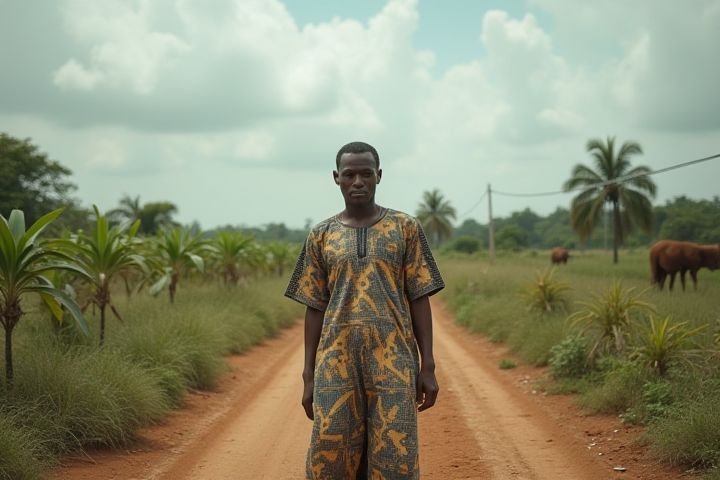
Nigeria's political landscape is characterized by a dynamic multiparty system, with the All Progressives Congress (APC) and the People's Democratic Party (PDP) being the dominant forces. Federal and state elections are crucial events that shape governance, influenced by diverse ethnic and religious identities across the nation. Corruption remains a significant challenge, impacting public trust and hindering economic development. The recent rise of youth activism and social media engagement signals a shift toward greater political awareness and participation among the younger population. Your understanding of Nigeria's political climate will deepen by examining the historical context of military rule and the ongoing struggles for democracy and accountability.
Multi-party system
Nigeria operates a multi-party system characterized by various political parties competing for power at local, state, and federal levels. The two dominant parties are the All Progressives Congress (APC) and the People's Democratic Party (PDP), which shape much of the country's political discourse and policy-making. Regional parties also play significant roles, reflecting Nigeria's ethnic and cultural diversity, with parties often aligned along regional and religious lines. Engaging in this dynamic political environment can provide valuable insights into Nigeria's governance, electoral processes, and the ever-evolving demands of its populace.
Federal republic
The Federal Republic of Nigeria operates a multi-tiered governance structure that includes federal, state, and local government levels. The political system is characterized by a presidential system, where the President serves as both the head of state and government, steering national policy and administration. Nigeria's diverse population influences its political dynamics, with various ethnic groups and religions playing significant roles in shaping party affiliations and electoral outcomes. Frequent political challenges, including corruption and security issues, continue to impact governance and the overall stability of the nation.
Presidential system
Nigeria operates under a federal presidential system, characterized by a division of powers between the national and state governments. The President, elected for a four-year term, serves as both the head of state and government, wielding significant executive authority. The political landscape is dominated by two major parties: the All Progressives Congress (APC) and the People's Democratic Party (PDP), which influence policy-making and governance. Regional dynamics, ethnic diversity, and socio-economic factors play critical roles in shaping electoral outcomes and political affiliations throughout the country.
All Progressives Congress
The All Progressives Congress (APC) is a dominant political party in Nigeria, formed in 2013 through the merger of four opposition parties. It has played a crucial role in shaping the country's political landscape, particularly after winning the presidency in 2015, marking the first time in Nigeria's history that an incumbent president was defeated. The party's agenda emphasizes economic reforms, anti-corruption measures, and improved security, reflecting the challenges facing the nation. As you engage with Nigerian politics, understanding the APC's influence on governance and policy-making will provide valuable insights into the direction of the country's future.
People's Democratic Party
The People's Democratic Party (PDP) has been a dominant political force in Nigeria since its establishment in 1998, playing a significant role in shaping the country's democratic framework. With a commitment to promoting social justice and economic development, the PDP has consistently positioned itself as a champion of the people, advocating for policies that address issues like poverty, education, and healthcare. Your engagement in the party's activities highlights the importance of grassroots involvement in influencing national policies and governance. Despite facing challenges from rival parties, the PDP continues to adapt its strategies, aiming to regain its influence in Nigeria's evolving political dynamics.
Ethnic diversity
Nigeria's political landscape is intricately shaped by its rich ethnic diversity, comprising over 250 distinct ethnic groups, with the three largest being the Hausa-Fulani, Yoruba, and Igbo. This diversity influences political affiliations, as various ethnic groups align with regional parties that reflect their cultural identities and interests. Furthermore, power-sharing agreements, like the rotation of the presidency between regions, aim to promote inclusivity and mitigate ethnic tensions. Understanding these dynamics is crucial for comprehending Nigeria's governance, electoral processes, and the challenges it faces in fostering national unity.
Regional tensions
The political landscape in Nigeria is significantly influenced by regional tensions, particularly among the North, South, and the Middle Belt areas. Ethnic diversity and economic disparities contribute to ongoing conflicts, leading to power struggles and demands for resource allocation. The rise of regional separatist movements further complicates governance, as groups advocate for autonomy and recognition of their rights. Understanding these regional dynamics is crucial for unraveling the complexities of Nigeria's political environment and promoting sustainable peace.
Security challenges
The political landscape in Nigeria is significantly shaped by various security challenges, including insurgency, ethnic violence, and kidnappings. The Boko Haram insurgency in the northeastern region has led to widespread displacement and humanitarian crises, affecting millions. Moreover, banditry in northern states exacerbates insecurity, with frequent attacks on communities and an increase in kidnapping for ransom. As a citizen, staying informed about these security issues is crucial for participating in dialogue and advocating for effective policy solutions.
Economic disparities
The political landscape in Nigeria is heavily influenced by significant economic disparities that shape governance and policy-making. Wealth and resources are unevenly distributed, leading to regional inequalities that affect access to education, healthcare, and employment opportunities. This economic divide often fuels social unrest and affects citizens' trust in governmental institutions, as many feel marginalized in decision-making processes. Understanding these disparities is crucial for addressing the core issues of poverty and inequality that persist within the nation.
Youth political engagement
In Nigeria, the political landscape is increasingly influenced by youth engagement, reflecting the aspirations and demands of the country's vibrant younger population. With over 60% of Nigerians under the age of 25, initiatives such as the Not Too Young To Run campaign have mobilized young people to contest for political office and advocate for reforms. Social media platforms play a crucial role in this movement, enabling youth to voice their opinions, organize rallies, and promote civic education. Your participation in elections and political discussions is vital for shaping a more democratic and inclusive future in Nigeria.
